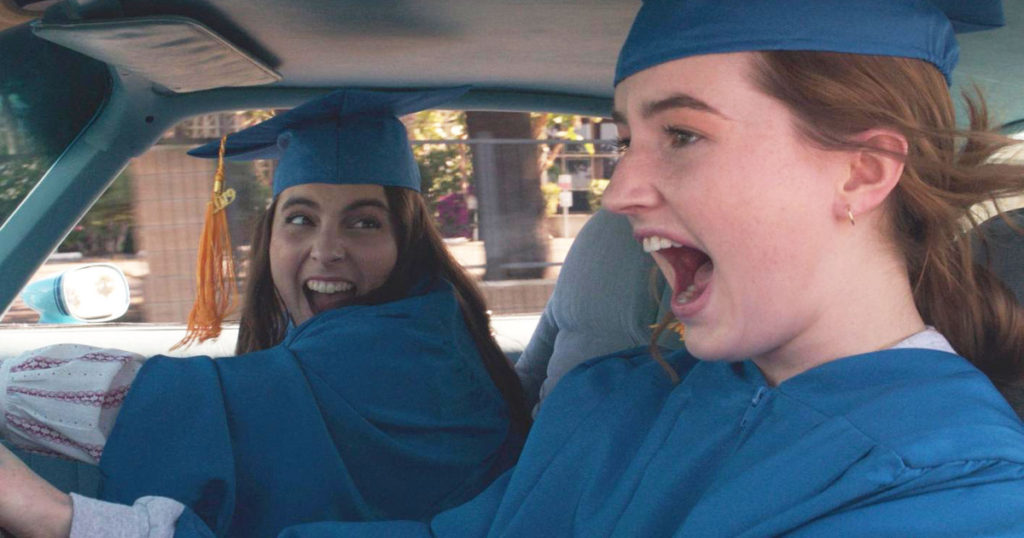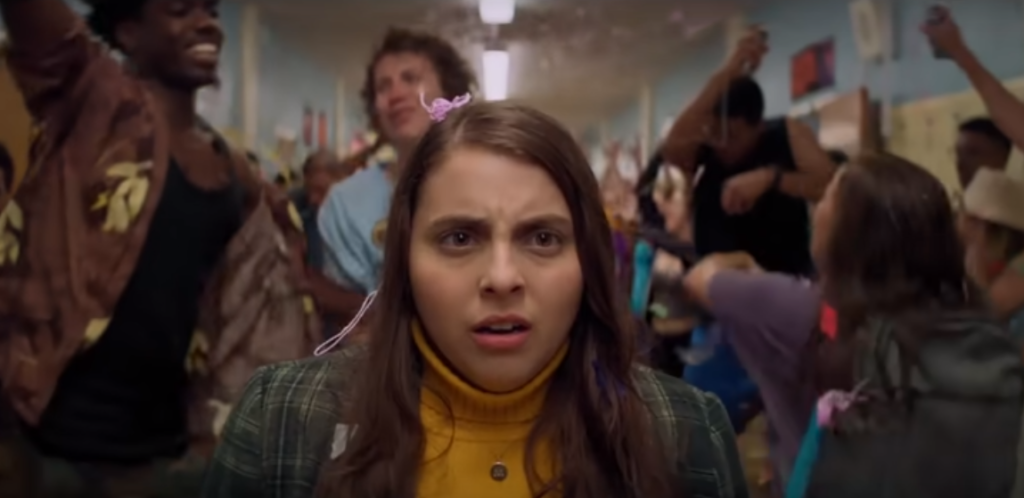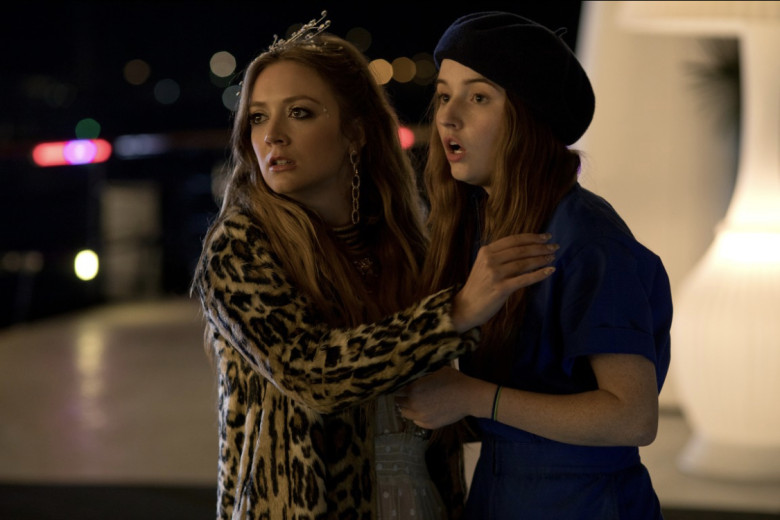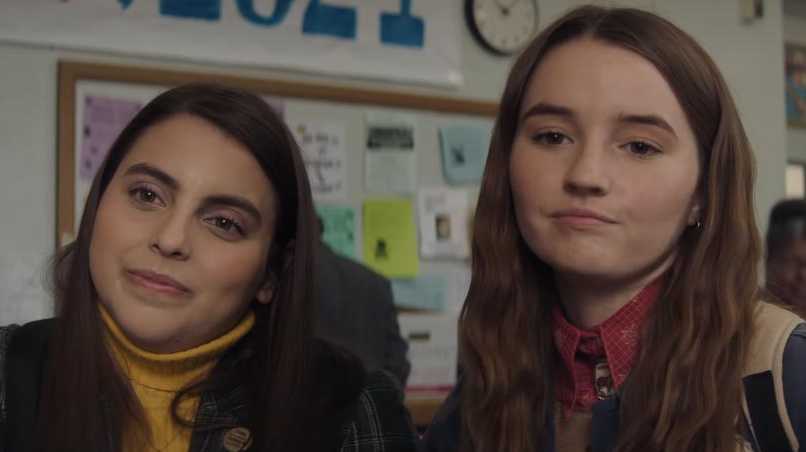
Lots of high school movies feature a comic scene set in a bathroom—Lindsay Lohan eating alone in Mean Girls, Eddie Kaye Thomas defecating in American Pie, That Scene in Fast Times at Ridgemont High—but Booksmart, as it does time and again, flips the script. Quietly revising grammatically incorrect graffiti inscribed on a stall, valedictorian Molly (the magnetic Beanie Feldstein) overhears three of her classmates mocking her. Stung but not surprised, Molly emerges dramatically from the stall and unleashes a measured but vindictive riposte, calmly informing her intellectual inferiors that she will one day have the last laugh. Yet as she spins on a heel to leave in triumph, a quiet reply stops her in her tracks; one of her ostensible bullies casually announces that she’s going to Yale. Another will be attending Stanford; the third has already secured a lucrative job at Google. In a split second, Molly’s supposed supremacy—academic, personal, moral—has been flushed down the drain.
Booksmart, the finely cut and completely hilarious directorial debut of Olivia Wilde, is hardly revolutionary. It is instead a proud member of the One Crazy Night genre, a freewheeling, episodic narrative of absurdity, embarrassment, and misadventure. But even as it accumulates belly laughs and imparts familiar lessons, Booksmart simultaneously punctures your assumptions about how movies like this should look and behave. Like Molly, it is smart, energetic, and determined. Yet it is also exactly the kind of film that Molly herself might underestimate, gradually revealing hidden depths that you never suspected were there.
The heart of Booksmart lies in the friendship between Molly and Amy (Detroit’s Kaitlyn Dever). They are, in grand cinematic tradition, Best Friends; joined at the proverbial hip, they drive to school together—the opening scene, in which Amy picks up Molly outside her apartment, is one of many moments that seem to quote Superbad—eat lunch together, and know one another’s most intimate secrets. As the title implies, they are both scholarly, which means they also share a recognizable degree of irritation with their loudmouthed peers, whom they perceive as loutish ingrates who stupidly prioritize partying over studying. The movie takes place on the last day of their senior year, and their palpable desire to move on from their school’s raucous hallways—to enter the next phase of their life, when their brains will finally be appreciated—is one of many ways in which they’re completely alike.

They are also extremely different. Where many female movie nerds are meek to the point of invisibility, Molly is poised and brash, suffering no fools and regularly venting her frustration. Amy, on the other hand, is reserved and tentative, nursing a crush on a classmate (Victoria Ruesga) but failing to act on it despite Molly’s urging. The result is a relationship that’s both intensely close and curiously asymmetrical; Molly is the perpetual instigator, Amy the weary reactor. And so, while the film’s premise—Molly, enraged to discover that her classmates have spent the past four years enjoying themselves without sacrificing their earnings potential, resolves to live her final night of high school to the fullest, and she convinces Amy to partake in the revelry—may be pure comedy fodder, it’s also symptomatic of the hidden rift in the girls’ personalities. The screenplay, which was originally drafted by Emily Halpern and Sarah Haskins and then revised by Susanna Fogel and Katie Silberman, explores this dynamic gently, letting its facets and complications emerge organically before culminating with a volcanic scene at a party, where the two friends erupt with long-held resentments.
Wilde directs the hell out of that scene, which she captures in a single, encircling take. And overall, the first-time filmmaker displays a remarkably steady hand with the camera, recognizing when to take risks and when to pull back and let her actors do the heavy lifting. (Sample grace note: Amy’s bedroom is adorned with a sign that reads “A Room of One’s Own”, a clever design choice that Wilde feels no obligation to embellish.) There are several sequences of verve and invention—a delightful detour into surrealism in which Molly and Amy turn into shapely dolls; an underwater swim featuring just the right combination of youthful wonder and looming danger—along with a lithe and efficient sense of style.

There is also an abiding affection for the characters, and not just the leads. Molly may view her classmates as archetypes from an ’80s comedy—the dumb jock, the theater nerd, the awkward misfit—but Wilde methodically demolishes those generalizations, creating practically an entire student body that teems with detail and dimension. The strong supporting cast helps; Skylar Gisondo (Santa Clarita Diet) is achingly sincere as a rich kid desperate to be liked, while Molly Gordon shatters stereotypes as a sex-positive mean girl. The obvious standout, however, is Billie Lourd as Gigi, a firestorm of impish wit and anarchic energy; the runner in which Gigi randomly appears out of nowhere is one of Booksmart’s funniest and most inspired touches.
Not that it lacks for competition. As a character study, Booksmart is deeply heartfelt, and Feldstein and Dever both deliver nuanced performances that (in keeping with the rest of the film) yield far more than initially meets the eye. But the movie’s sweetness and sensitivity in no way dilute its comedy, which is extraordinarily sharp and versatile. Wilde doesn’t discriminate in her humor, trafficking in bawdy wordplay, zany slapstick, and good-old-fashioned mortification. Naturally, some of the laughs are bigger than others—my favorite was probably the haphazard collision between ad hoc research, streaming pornography, and the school principal—but they all reflect the script’s intelligence and Wilde’s adroit staging.

Much like Molly, Booksmart is imperfect. A key late scene hinges on a secondary character who isn’t quite as developed as she needs to be, especially compared to the rest of the cast. A subplot involving a spacey student crushing on a cool teacher unintentionally raises some eyebrows, and would likely be anathema if the genders were flipped. And while the movie shares certain traits with Lady Bird (including the use of Alanis Morissette, just one highlight of an obscenely stacked soundtrack), it lacks that film’s scope and complexity, particularly in its treatment of parents; Amy’s mom and dad (amusingly played in cameos by Lisa Kudrow and Will Forte) are portrayed as silly and oblivious, while Molly’s relations are never even seen.
Then again, when you’re in high school, your parents just spoil the fun. And despite a rather abrupt ending, Booksmart is a joyous experience, full of life and truth and warmth and pain. You would think that a movie which follows the revelation of a stuffed animal as a sex toy with the earnest feminist invocation of “Malala” would feel disjointed, but Booksmart’s ruefulness mingles perfectly with its comedy. It concludes with a buoyant commencement ceremony, which only underlines its status as the rarest of cinematic graduates: the class clown that’s also the most likely to succeed.
Grade: B+
Jeremy Beck is the editor-in-chief of MovieManifesto. He watches more movies and television than he probably should.
